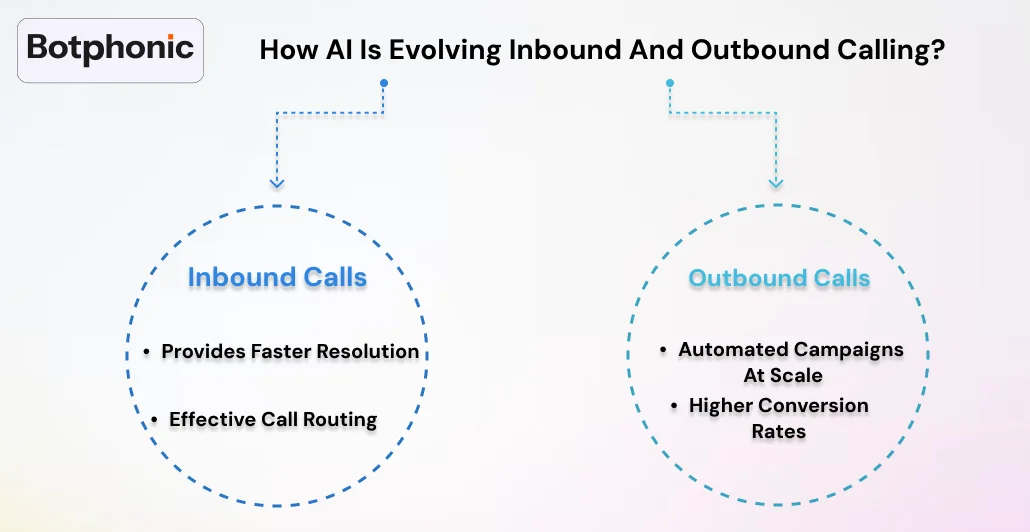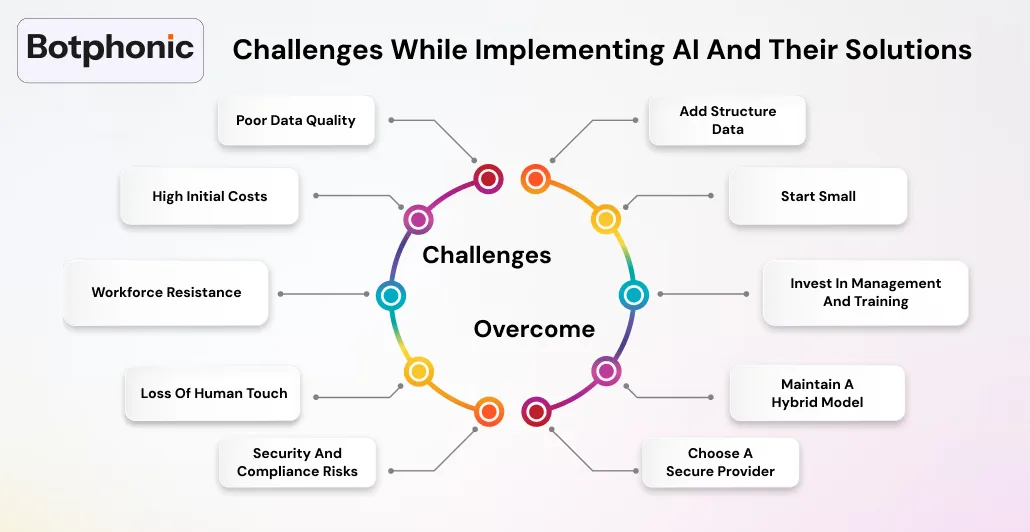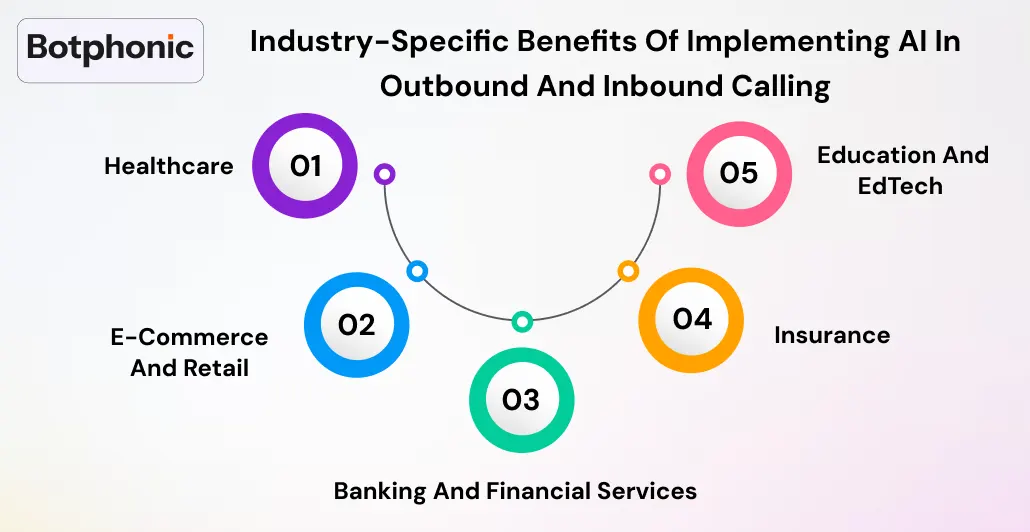
Summarize Content With:
Quick Summary
In this post, we are going to know how AI is not just evolving itself but also revolutionizing inbound and outbound calling in the US. And what are the challenges that you might face while implementing the same, but with no issues? It’s not just challenges that we are going to tell you but solutions as well, along with industry-specific benefits, so you know how it will help your industry grow significantly.
Introduction
Feeling tired of making and receiving calls? That too, being from the US, and sometimes facing Karen, can be really irritating too. Don’t worry, we have got you, just integrate your work with AI and how AI is reshaping inbound and outbound calling in the US and how it’s benefiting not just one but several industries at once. Automating AI inbound outbound calling can help you save your energy from repeating the same answers again and again, and will let you focus on tasks that are much more important than just talking to people over the phone. Let’s get into this and be an expert:
Understanding AI Inbound and Outbound Calling
There are certain calls made by organizations, and there are some that are made by prospective customers to the companies; these calls might be for sales or for order inquiries. Well, these are the calls which are categorized into two types. One is inbound calling, and the other is outbound.
What is AI Inbound Calling?
Inbound calls are made by people to reputed companies for their own interest. Initially, it might be for asking relevant questions related to their product or business hours. In these types of calls, companies help fulfill customers’ needs and focus on providing impressive customer support.
What is AI Outbound Calling?
Outbound calls are made by companies to people who might have little to no known interaction with the brand, to introduce themselves and their services. It might also be done for doing follow-ups or even for marketing campaigns. Outbound calls put their emphasis on generating leads, sales, or for gathering feedback.
How AI is Evolving Inbound and Outbound Calling?

With advanced technology and software, AI is helping these calling methods go beyond your expectations and desires.
How AI is Transforming Inbound Calls?
1. Provides Faster Resolution
An AI customer service agent helps to instantly resolve customers’ queries, even without involving human agents.
2. Effective Call Routing
AI calling has a smarter approach to understand customers’ intent and helps them escalate to human reps, who have relevant knowledge for the query.
3. 24/7 Support
Integrating an AI helpdesk enhances customer support and assists in providing uninterrupted support.
How AI is Enhancing Outbound Calling?
1. Automated Campaigns at Scale
AI customer support is efficiently managing thousands of calls all at once, while delivering a customized experience for each.
2. Higher Conversion Rates
Analyzing previous interactions and customer behaviors helps AI systems to predict the right time to call and tailor a message.
3. Real-Time Analytics
AI outbound calling tools assist with data collection and self-improve after each interaction to refine strategies and performance.
Use Cases in Modern Contact Centers
1. AI-Powered Inbound Call Handling
AI IVR systems handle basic queries such as FAQs, order tracking, and others.
2. Smart Call Routing
Analyzing the caller’s intent and routing them to the responsible agent for further communication has become easier.
3. Automated Outbound Calling
Helpdesk AI facilitates calling for reminders and follow-ups. It helps collect feedback surveys at scale.
4. Conversational AI and Chatbots
AI can handle simple tasks easily and share details for monitoring, too.
5. Real-Time Agent Assistance and Analytics
Incorporating AI in customer support assists with the provision of live suggestions and analyzes call data for quality improvement.
Challenges While Implementing AI and Their Solutions

Conversational AI for customer support offers various fascinating benefits, but did you know that while implementing it, you might face various challenges that you might have never ever thought of? Let’s discuss those challenges in detail, and don’t worry, we won’t leave you hanging; we will help you with solutions too.
Challenges:
1. Poor Data Quality
Artificial intelligence customer care typically relies on a large volume of data shared by users; it needs well-structured data for clear understanding and sharing the info. Many organizations fail to do so.
2. High Initial Costs
Implementing AI, that too if it’s voice AI or advanced IVR AI, usually requires a huge upfront investment in infrastructure, software, and training too.
3. Workforce Resistance
With integration with Artificial Intelligence Customer Service, employees might even resist AI adoption, due to the fear of job replacement.
4. Loss of Human Touch
Sometimes, even overautomating the tasks might frustrate customers, as there are some areas where they might seek empathy or face complex problem-solving.
5. Security and Compliance Risks
AI tools typically deal with sensitive data and have to comply with privacy regulations like GDPR or CGPA, which can be a major concern for the same.
Overcome These AI Implementation Challenges:
1. Add Structured Data
For better-structured data, use data cleansing tools and opt for platforms that offer smooth integration with your CRM and other tools.
2. Start Small
Always start with low risk, and choose areas that won’t affect you as much, even if something goes wrong. For instance, using AI chatbots or voice assistants for FAQs.
3. Invest in Management and Training
Ensure to train your employee and educate them about its benefits, on how it’s going to make their work easier, and that it’s not going to replace them.
4. Maintain a Hybrid Model
Optimize the Human-AI hybrid model to manage relevant tasks. Use AI for repetitive tasks, and make live agents available for high-emotion and complex issues.
5. Choose a Secure Provider
Work with an AI customer service agent who has assured global data protection service standards and offers essential features such as encryption and audit trails.
Industry-Specific Benefits of Implementing AI in Outbound and Inbound Calling

1. Healthcare
- With automating appointment scheduling, there are less number of no-shows.
- IVR AI helps patients access their test results and work through them effectively.
2. E-Commerce and Retail
- Incorporating AI inbound and outbound calling helps re-engage with abandoned carts and provides effective customer support.
- Conversational AI assists with order tracking and other relevant requests instantly.
3. Banking and Financial Services
- AI helps with sending fraud alerts and loan updates to create awareness regarding the situation.
- Adding AI outbound systems supports upgrading sales and plan renewals.
4. Insurance
- AI outbound calling helps with adding premium reminders and renewals.
- Assists in claiming status inquiries and offers faster customer retention.
5. Education and EdTech
- AI contact centers can handle queries related to admission and fee structure, while sharing fee reminders and answering FAQs.
- Provides 24/7 assistance to students through voice bots or AI call assistant.
While AI inbound and outbound calling have numerous benefits, they all provide you with instant support and assist in increasing your operational efficiency.
Criteria For Choosing the Right AI Call Center Solution

After knowing the benefits of AI, who wouldn’t want to add these impressive tools to their organizations, right? But there are some criteria that you really need to know about for picking the right one.
Let’s discuss them and help you choose your perfect one:
1. Use Case Alignment
Choose a solution that suits your requirements and helps you achieve your goal.
2. Ease of Integration
The solution you have chosen should be easy to integrate with your existing database platforms.
3. Natural Language Processing
Pick a system that comes with a strong foundation of conversational AI and NLU capabilities. Focusing on this will help you perceive accents and intent correctly.
4. Scalability and Customization
Search for an AI call center that helps you grow with your business and adapts to your business needs.
5. Security and Compliance
Ensure that the platforms you have elected support GDPR, HIPAA, and even local compliance requirements too. It should facilitate data encryption, access control, and audit logs, too.
6. Reporting and Analytics
A good solution should offer you real-time dashboard features and sentiment analysis, which will help you monitor effectively. Even with call transcription, so you can see if there’s any adjustment required.
7. Human-AI Handoff Capability
Seamless escalation of calls from AI to human agents is necessary for managing complex or sensitive issues, which need to be resolved by empathy.
By integrating the right AI solution in your industry, you can enhance your overall productivity and promote customer support experience.
Conclusion:
Companies are collaborating with AI, and it is miraculously helping them. AI is reshaping inbound and outbound calling in the US. By implementing automation to these tasks and creating a human-line interaction with the user, they are helping companies scale on a bigger level. Whether it’s healthcare, e-commerce, finance, or even education, AI is everywhere, making its way and helping them grow.

